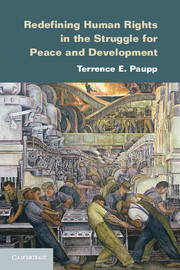Book contents
- Frontmatter
- Dedication
- Contents
- List of Tables
- Foreword
- Acknowledgments
- Introduction
- 1 The greatest undiagnosed problem in international law
- 2 From disparity to centrality: How the human rights to peace and development can be secured
- 3 Confronting structural injustice: Strategies of localization, regionalism, and an emerging global constitutional order
- 4 The power of law versus the law of power: How human rights can overcome inequality, poverty, and vested interests
- 5 A world community that includes all human communities: Indigenous communities and the global environment as sources for human rights claims
- 6 Actualizing the human right to peace: Paths for developing processes and creating conditions for peace
- Conclusion Transformation through cooperation: Implementing a human rights–based approach to human security
- Biography of Terrence E. Paupp
- Appendix 1 Principles Relating to the Status of National Institutions (The Paris Principles)
- Appendix 2 Tilburg Guiding Principles on World Bank, IMF, and Human Rights
- Appendix 3 Universal Declaration of the Rights of Peoples (Algiers, 4 July 1976)
- Appendix 4 The Freedom Charter (Africa, 1955)
- Index
- References
Conclusion Transformation through cooperation: Implementing a human rights–based approach to human security
Published online by Cambridge University Press: 05 June 2014
- Frontmatter
- Dedication
- Contents
- List of Tables
- Foreword
- Acknowledgments
- Introduction
- 1 The greatest undiagnosed problem in international law
- 2 From disparity to centrality: How the human rights to peace and development can be secured
- 3 Confronting structural injustice: Strategies of localization, regionalism, and an emerging global constitutional order
- 4 The power of law versus the law of power: How human rights can overcome inequality, poverty, and vested interests
- 5 A world community that includes all human communities: Indigenous communities and the global environment as sources for human rights claims
- 6 Actualizing the human right to peace: Paths for developing processes and creating conditions for peace
- Conclusion Transformation through cooperation: Implementing a human rights–based approach to human security
- Biography of Terrence E. Paupp
- Appendix 1 Principles Relating to the Status of National Institutions (The Paris Principles)
- Appendix 2 Tilburg Guiding Principles on World Bank, IMF, and Human Rights
- Appendix 3 Universal Declaration of the Rights of Peoples (Algiers, 4 July 1976)
- Appendix 4 The Freedom Charter (Africa, 1955)
- Index
- References
Summary
Current human rights discourse and practice has a choice, a fork in the road, as Kofi Annan put it with regard to the UN: it can either insinuate itself with hegemonic international law or it can serve as an important tool in developing and strengthening a counter-hegemonic international law. By ignoring the history of resistance to imperialism, by endorsing wars while opposing their consequences, and by failing to link itself with social movements of resistance to hegemony, the main protagonists of the Western human rights discourse are undermining the future of human rights itself
(Rajagopal 2008, 71).The world is perilously close to resembling medieval Europe, a time and place when every distinct interest group employed its own private army. As the ability of individual developing countries to govern effectively diminishes, as the market in the industrialized countries for narcotics grows increasingly, as the interests of weapons manufacturers to find new outlets is spurred by East-West detente, as the likelihood for economic equity diminishes, the political stability of the developing countries appears in many instances to be disturbingly remote. That instability, inexorably, affects the stability, the welfare, and the interests of the industrialized countries as, directly and indirectly, the violence and the terrorism spill across boundaries. The usual Northern response of still more weaponry is as immoral as it is bankrupt of results
(Head 1991, 174).- Type
- Chapter
- Information
- Publisher: Cambridge University PressPrint publication year: 2014



